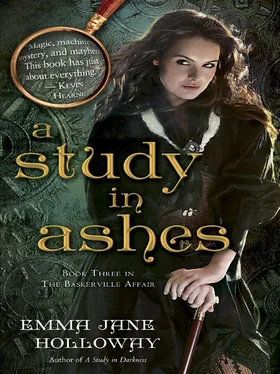“Don’t you know who we are, laddie?” the man protested.
Tobias growled in reply. The man and his friend were dressed in evening clothes, but both wore a puff of red silk in the breast pocket of their tailcoats. It marked them as men in the service of the Scarlet King. “I don’t bloody care.”
He heard the feet of the other man behind him, building up momentum like a rusty engine. Tobias sidestepped in plenty of time, releasing his hold on his prisoner. One crashed into the other, and they both tumbled down the steps, narrowly missing the clock and all but landing in the arms of the footmen coming up the staircase. Since footmen were generally hired for their healthy physique, they grabbed the men with ease. The younger of the two looked up, inquiry in his wide brown eyes.
“Do something with those two, will you?” Tobias said wearily.
“Aye, sir,” the lad said, heaving his charge upright. “Right away, sir.”
“And call one of the maids to clean up. There’s a bit of a mess.”
Lord Bancroft, standing at the bottom of the steps, looked like he’d swallowed a mouthful of vinegar. He led the footmen and their burdens toward the door, no doubt to put a favorable mask on events, or perhaps to spout a few lines to any roaming newspapermen. The brief moment of father-son cooperation was at an end.
Still twitching with energy, Tobias turned and went back up the stairs, pausing to set the étagère to rights and rescue what plants he could. He scraped dirt back into the pots, covering over the straggling roots of the ferns. It was a servant’s job, but he couldn’t stand to wait for someone else to repair the damage. A low fury thrummed through him, setting every sense on alert. It wasn’t just the broken vase or spilled dirt that set his skin prickling, but the disrespect. The minions of the steam barons seemed to feel the world was theirs—even the private places of their host’s family home. And whatever Bucky had said, Tobias never counted himself as one of the steam barons’ insufferable hangers-on. Tobias’s set had never been angels, but they knew to take their bad behavior to a brothel or a private club.
He’d barely finished the thought when he heard the creak of a floorboard. He rose, turning and flicking dirt from his fingers. Imogen’s bedchamber, as always, showed a light under the door. She had always suffered nightmares and, at Lady Bancroft’s orders, her daughter was never left alone in the dark.
The creak came again, and Tobias wheeled around. The sound hadn’t come from Imogen’s room but from the stairs behind him. William Reading was watching him with his head cocked to one side, his lips in a sly curve, and a large brass bird clutching his wrist.
POPPY WAS GETTING bored again. Guests were crowding back to the party now that the crisis of the firebird was past, and there seemed to be twice as many people as before. The talk was mostly about the attack on Westminster. Poppy had heard all that already in the past few days—even the wilder theories. The rest of the chat was about politics in general. It was a subject she couldn’t care less about—or at least never had—but a sense of self-preservation had forced her to pay more attention lately.
As she understood it, there were two main groups of citizens in the Empire. There were the steam barons who made up the Steam Council, and then there was the rest. A few nobles still wielded a lot of power, but everyone up to and including the queen herself had lost ground to the barons. Poppy had learned a lot about that from her own family. Lord Bancroft had done something that displeased Jasper Keating—she’d never learned exactly what—and that hadn’t sorted itself out until Tobias married Alice and went to work for Keating Utility. Unfortunately, Tobias had wanted to marry someone else—Imogen’s best friend, Evelina Cooper. Her brother hadn’t been quite right since.
The problem was that people talked about politics but nobody ever did anything—about the barons, or the poor, or the crime, or even how uncomfortable they were in fashionable clothes. People were too busy fussing about what everyone else thought, and her mother was trying to make Poppy just like the rest—a good and dutiful girl. It made her want to kick something over.
She wondered if whoever had driven that ship into the Clock Tower had felt that way. A tiny part of her admired that kind of initiative and, after all, no one had actually been hurt, right?
She’d made it to the food, arranged as a buffet on one side of the room. It was just light fare, meant for grazing rather than as a full meal. That would come later and be served with the proper pomp in the dining room.
Footmen guarded the table, though they occasionally glanced around at the ceiling, presumably looking for flaming birds of prey. Beside them stood a steam samovar that automatically dispensed tea with lemon or milk at the touch of a button. Poppy eyeballed the savories, arranged temptingly on silver platters. Snowy damask linens draped the table, giving it the appearance of an altar. All hail the temple of luxury . Too bad her stays were too tight to eat a thing.
And then she spotted a lone figure dressed in black, standing near the end of the table. He must have arrived late, because she hadn’t seen him before this, but she knew the man at once—Sherlock Holmes, the detective. It was likely he was there at Keating’s request—the Gold King liked to show off those he considered his extended entourage.
Intrigued, she watched him from the corner of her eye. This was a man who did things, whether people thanked him for it or not. He didn’t let mysteries fester like something nasty left under the table for the dogs, and he didn’t give up on people in trouble. When Evelina Cooper had disappeared, he’d kept looking for months until she was found wounded in the East End. Of course, Evelina was his niece.
Just as Imogen was her sister. There was no giving up on people you loved. Still, Poppy felt a rush of trepidation, like something cold trickling down her back. She cast another glance in Holmes’s direction. He was tall, thin, and austere looking, all lean angles. Dark hair swept back from a widow’s peak; a hooked nose emerged like a blade from sharply marked brows. He looked like a man with no tolerance for trivialities.
If only she wasn’t wearing pink frills! It was bad enough being fifteen without looking like a raspberry trifle. Never mind. There is no time like the present . That was her motto. Or at least it was now.
Poppy took a gulp of air to stifle the butterflies in her stomach and approached the foremost detective in London. She affected a stroll, refusing to creep or cringe or, worse yet, bound toward him like an eager puppy.
“Mr. Holmes, I presume,” she said, trying to sound like her mother.
He turned toward her. His eyes were gray—not the stormy gray of her brother’s, or the dove-gray of Imogen’s, but the gray she imagined for Antarctic ice. For the merest second, Poppy quailed—but it didn’t last. With her, fear seldom did.
“You are Evelina’s uncle,” she said.
There was no obvious change in the man, but the corner of his mouth quirked, as if some of that ice had thawed. “And you, I believe, are Miss Poppy Roth.”
She liked the fact that he used Poppy and not Penelope. That meant he knew something about her. “I am. And I would like to engage your services.”
She had half expected him to laugh then, but his face grew utterly serious. “What is the case, Miss Roth?”
Her pulse was pounding, and the wretched stays were stealing her breath. She suddenly realized this was why so many women fainted all the time—they were being strangled by their underthings. “I require someone to look into the circumstances of my sister’s illness.”
Читать дальше








